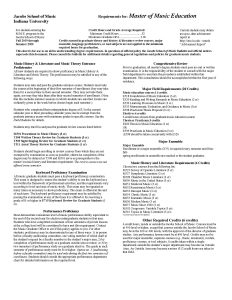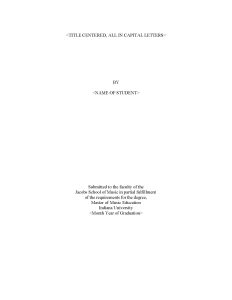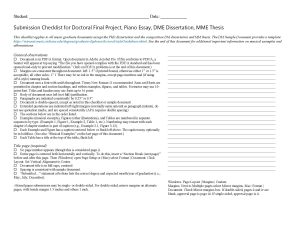6 Section 6: JSOM Master’s Programs in Music Education
Section 6
Master’s Program
Details
Master’s Programs in Music Education
The Jacobs School of Music offers the Master of Music degree with majors in music performance, conducting (choral, orchestral, and wind), early music, jazz studies, organ and sacred music, composition, computer music composition, and music theory; the Master of Music Education degree; and the Master of Science in Music Education. Through the University Graduate School, students may seek the Master of Arts degree with a major in musicology.
The minimum requirement for a master’s degree is 30 credits (some degrees may require more), excluding required credit hours in prerequisite or review courses and major ensemble.
The following links provide additional details on the course of study for master’s degrees.
- General Information on Master’s degrees, including entrance exams and proficiency tests − https://intranet.music.indiana.edu/degrees/graduate-diploma/masters/masters.html
- Master’s program policies − https://intranet.music.indiana.edu/degrees/graduate-diploma/masters/mastersPol.html
- Double major and double degree options − https://intranet.music.indiana.edu/degrees/graduate-diploma/masters/double.html
If you began your graduate work before Fall 2020, a previous version of the requirements sheet may apply. Please see the Graduate Coordinator for Music Education or an advisor in the Graduate Office, East Studio Building 120, for a copy of your exact program requirements.
Jacobs School of Music
Indiana University
Requirements for: Master of Science
Music Education
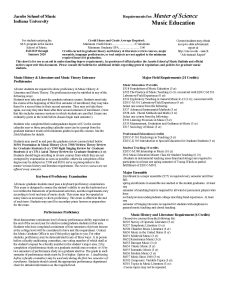
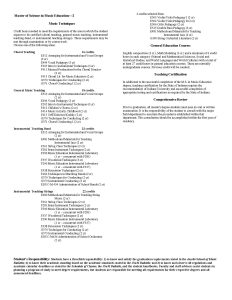

Master of Science in Music Education, with certification
In the second semester of each student’s first year of study for the MS degree, the student will undergo an “MS First-Year Review.” Similar to the Upper Divisional Review required of undergraduate students in their second year of study, the MS First-Year Review is designed to ensure that MS students are making adequate progress toward becoming a professional music educator in the following areas:
-
-
- progress and performance in course work
- depth and breadth of field experience
- oral communication of attitudes and beliefs about music and music education
-
A rubric will be utilized to provide feedback regarding each of these areas.
Each MS First-Year Review takes approximately 15 minutes. Results letters are usually distributed within one week after the reviews are completed.
Most students will complete the MS First-Year Review in the spring, usually in the first week after Spring Break in March. Students who start their degree program in the middle of an academic year will have their review in the week after Thanksgiving break. Also, students who had difficulty with individual components of the Review may be given an opportunity to repeat those portions at the next regularly scheduled time for Reviews. Students who have a great deal of difficulty with the Review will be asked to meet with a faculty member for advising and development of an improvement plan.
Music Education Department: MME Capstone Procedures
- The capstone project will be developed partly through work completed in MUS-E 520: Reading and Writing Research in Music Education, but primarily through work with a capstone committee chair.
- After completion of MUS-E 520, the student will identify a music education faculty member who they will ask to serve as the chair of their capstone committee. The student will meet with the faculty member to discuss the work that they have completed in MUS-E 520.
- The student will discuss the three capstone options with the chair of their capstone committee and choose the option that is best suited to their professional goals (see below for more information about each option):
-
- An original research report
- A practical project relating to music curriculum and instruction
- An oral exam
4. The student will work with their capstone chair to develop a formal topic proposal using the template appropriate for their respective capstone format choice (see below for proposal templates).
5. In consultation with their capstone chair, the student will identify two additional music education faculty members to serve on their capstone committee and circulate their formal topic proposal among them. It is customary to provide adequate time for faculty to read and provide feedback on your work, which may range from 1-4 weeks. (Note: school breaks are not included in timelines.)
6. The two additional members of the capstone committee will communicate with the student and the faculty member serving as their capstone chair to indicate whether they agree to serve on the student’s committee and whether they believe the student is ready to move on to complete their project. If the faculty are not satisfied with the proposal, then the student may revise their work in consultation with their capstone chair and circulate it again.
7. Once all three music education faculty members agree to serve on the capstone committee, then the student will submit their formal proposal form to the music education graduate coordinator.
-
- If the project involves work with human subjects, including surveys or interviews, the student must get permission from the University’s Office of Human Research Protection Programs before proceeding with their work.
8. The student will work closely under their capstone committee chair’s guidance and consult with committee members as necessary when completing their proposed work.
9. Upon completing the work, the student will circulate the final drafts among their committee for approval for defense. It would also be prudent for students to identify a tentative defense date at this stage. It is customary to, again, provide adequate time for faculty to read and provide feedback on your work, which may range from 1-4 weeks. (Note: school breaks are not included in timelines.)
10. If approval is granted, the student may proceed with the defense, which must be scheduled such that all committee members are available to attend either in person or virtually. The defense may be open to the public or private with only the committee, at the discretion of the MME student.
11. The student will defend their work according to the guidelines presented under each respective capstone project option below.
12. The members of the committee will meet privately immediately after the defense to decide on its acceptability for the degree. Committees will now be asked (1) to indicate explicitly whether or not the event was satisfactory and—if the student chose a written capstone option—(2) to indicate whether any changes to the document are required before final approval and, if so, who will be approving those changes. The student is then invited back into the room for a conference with the committee. If a defense is deemed insufficient, then the committee will determine what remedial steps will be necessary as appropriate.
13. The capstone committee chair will inform the music graduate office when the defense is passed and issue a grade. If the student chose a written capstone option, they will prepare and submit a final version to the Music Graduate Office per the JSoM style guidelines: https://intranet.music.indiana.edu/degrees/graduate-diploma/doctoral/styleGuidelines.html As part of this process, the Music Graduate Office will perform a formatting review to confirm that the thesis matches the JSoM style guidelines.
14. It is customary to provide one’s committee chair with a copy of any final product.
Capstone Project Timeline
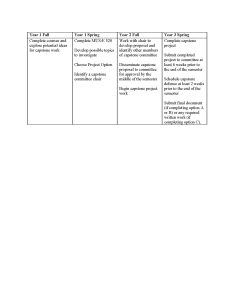
Capstone Project Options
Option A: An Original Research Report
- The student will conduct a systematic research study of appropriate scale and scope and produce an article-length research report in accordance with the style and structure customary of their chosen methodological approach. It is not expected that the main text of the research report would exceed 30 double-spaced pages, with 12 pt Times New Roman font. The student will also prepare an oral presentation of their reflections upon their experiences in the MME program. The reflection should address how the student has grown as a teacher, musician, and scholar during their time at IU. The students should draw from milestones experienced in their degree work (e.g., teaching/learning experiences, course work, and personal challenges) when developing their reflection presentation.
- The defense of this project should follow the format of a typical research presentation at a scholarly conference or symposium. The presentation of the project should be limited to 20 minutes, followed by approximately 30 minutes of questioning from the committee and, finally, approximately 10 minutes for any additional discussion prompted by other audience members in attendance.
Option B: A Practical Project Related to Music Curriculum and Instruction
- The student will create curricular and/or instructional materials of appropriate scale and scope that will be useful for them in a future music teaching position. The format of this product will vary based on each students’ idiosyncratic goals. However, each project should include a rationale and discussion of how their project was informed by existing scholarly works. It is not expected that the written component of a practical project would exceed 30 double-spaced pages, with 12 pt Times New Roman font. The student will also prepare an oral presentation of their reflections upon their experiences in the MME program. The reflection should address how the student has grown as a teacher, musician, and scholar during their time at IU. The students should draw from milestones experienced in their degree work (e.g., teaching/learning experiences, course work, and personal challenges) when developing their reflection presentation
- The defense of this project may follow the format of a typical research or “best practices” presentation at a scholarly conference or symposium or of a clinic session suitable for a music education professional development conference. The presentation of the project should be limited to 30 minutes, followed by approximately 20 minutes of questioning from the committee and, finally, approximately 10 minutes for any additional discussion prompted by other audience members in attendance.
Option C: An Oral Capstone Exam
- In consultation with their committee chair, the student will design three content questions that allow them to demonstrate the ability to evaluate, synthesize, and apply scholarly work in music education to their professional interests and goals. The student will then develop oral responses to these questions accompanied with a slideshow using scholarly works to support their arguments and/or points. The student will also prepare an oral presentation of their reflections upon their experiences in the MME program. The reflection should address how the student has grown as a teacher, musician, and scholar during their time at IU. The students should draw from milestones experienced in their degree work (e.g., teaching/learning experiences, course work, and personal challenges) when developing their reflection presentation.
- The defense of this project option will consist of 10 minutes of presentation followed by 10 minutes of questions from the committee for each of the three content questions, totaling 60 minutes. This will be followed by 10 minutes allotted for the presentation of the student’s reflections.
Guidelines for Research Involving Human Subjects (IRB Approval)
Under Federal regulations and University policy, all researchers who conduct research—including those completing master’s theses and doctoral dissertations or final projects—that involves human subjects or materials of human origin must submit an application to the Institutional Review Board (IRB), which reviews all research protocols on behalf of the IU Human Subjects Office (see https://research.iu.edu/compliance/human-subjects/index.html for full instructions). Approval of the research protocol must be in place before the researcher begins data collection. If you do not receive IRB approval for your project prior to beginning data collection and keep your approval current during the entire time that you collect and analyze data, your project may not receive approval by the Graduate School (for PhD dissertations) or JSoM (for MME theses, DME dissertations, and DM final projects). Similarly, many academic journals will not publish research conducted without IRB approval.
When you submit your application to the IRB, please note that the IRB requires that there be a faculty sponsor for student-led research and that the faculty sponsor be listed as the Principal Investigator (PI) on the project, even if the student is actually conducting the research. Both the student and the faculty sponsor must have completed the Human Subjects Protection tutorial and test. If you are working with a member of the faculty who regularly conducts research on human subjects, they will probably have passed the test and can be the sponsor of your application. If you are working with a member of the faculty who does not usually conduct this kind of research, he or she must take the steps to pass it. You should send your application to your faculty sponsor for review before submitting it to the IRB. The faculty sponsor can indicate their approval of the application by sending an email message to the Human Subjects Office.
Links to Key Information
IU Human Subjects Office
ttps://research.iu.edu/compliance/human-subjects/index.html − for forms, guidelines, procedures, deadlines, and additional information
https://research.iu.edu/compliance/human-subjects/index.html − click on the “complete training requirements” box to find the required social/behavioral researcher stage 1 training and testing.
Additional Resources
IU’s Research webpage − https://research.iu.edu/index.html− contains extensive information on many aspects of research
Frequently Asked Questions for the Requirement for Education on the Protection of Human Subjects, from the National Institutes of Health − http://grants.nih.gov/grants/policy/hs_educ_faq.htm
How to Prepare and Submit the Final Document
For all students pursuing the Master of Science in Music Education, the final project is the student teaching semester for which students enroll in EDUC-M580 and receive a grade from the supervisor of student teachers. MS students also complete a First-Year Review during their second semester of study (above).
Students pursuing the Master of Music Education are required to complete a thesis or practicum. The proposal and document must be approved separately by the student’s committee; the final grade will be submitted by the committee chair.
Instructions for preparing the document can be found at https://intranet.music.indiana.edu/degrees/graduate-diploma/doctoral/styleGuidelines.html. Note in particular the link to the Styles Guidelines for Graduate Capstone Projects – https://intranet.music.indiana.edu/degrees/graduate-diploma/doctoral/styleGuidelines.html− for organization and formatting requirements. A large amount of detail on the production of a thesis document is also available through the Graduate School at https://graduate.indiana.edu/academic-requirements/thesis-dissertation/doctoral-guide/index.html . A sample title page and signature page for Music Education thesis and practicum documents are below.

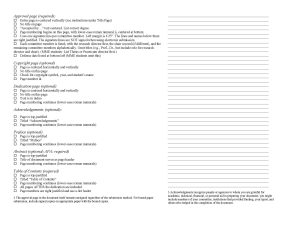
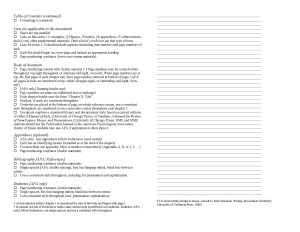
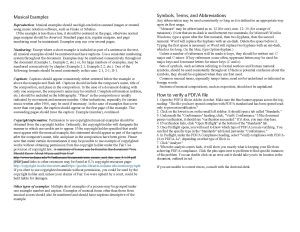
Find fillable forms here:
Fillable form 1
Fillable form 2

